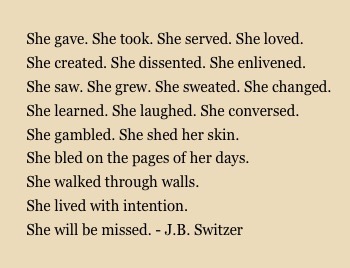I wrote a brief entry a few days ago about some idle conversations overheard in a rural Kansas town when the Civil Rights Movement became headline news. I should say, when it became headline news again, since I first encountered the term “Civil Rights” while going through newspaper archives from 1866, the year the first Civil Rights Act was passed. It becomes a newsworthy subject every now and then before being placed back on the shelf until things boil over again. Dave Lovewell responded to my entry entitled “What About Bob?” with a reminiscence of his own.
It seems to me that we all have prejudice to some degree. The problems are that some of us don't want to admit it and some see nothing wrong with it. I like to tell people that Lovewell's school system was years ahead of its time. We had black, Latino and oriental students and we had black, Latino and I am fairly certain Gay teachers. The truth probably is that both students and teachers were trapped there by circumstance but it was a good experience and gave a us a jump start on learning about the REST of the world.
We were rather more benighted in Formoso, which boasted fewer multicultural opportunities. We did have a high school science teacher who admitted to being an atheist, a principal reputed to possess hypnotic powers, and a junior-high teacher whose views on original sin might have seemed mainstream in the Middle Ages. They may not have been a representative cross-section of anything, but I did have the advantage of being schooled by an interesting mix of traditional educators and a few oddballs.
A sterling representative of the traditional category was Florence Westin, one of the last educators to teach in a one-room schoolhouse near Lovewell, and the first to wheel a TV into our classroom so we could witness space launches and splashdowns. One January day she led us to the home at the edge of town which she shared with her husband Carl, Superintendent of Schools in Jewell County. After serving us breakfast she switched on the TV and we began watching the inauguration of a new President. It was one of the benefits of those small class sizes of bygone days.
A teacher probably has to please more bosses than do most professionals - the public at large, zealous state legislators, parents, principals, superintendents, and school boards come to mind - and some of those bosses liked to exert what now seems undue influence over a teacher’s private life. At the start of the Great Depression, armed with a normal certificate, a recent valedictorian from Sinclair Rural High School started her teaching career at Hawthorne School in Grant Township, four miles southwest of Lovewell.
Shortly before the start of the fall term in 1930, Margaret Johnson slipped away to Concordia to be married to Melvin Switzer (brother of Wayne Switzer, Viola Ross and Evonne Intermill). The couple’s cover story, that they were going to Superior to take in the Ringling Bros. Circus “was blown by the prevalent habit of eavesdropping on the rural Kansas telephone party line.” Informed of the secret marriage, School District No. 42 challenged her teaching contract, but lost the fight.
While qualifications for teachers varied by locality, even the Kansas City board refused to hire married women until the male work force dried up in 1944. The change in policy also allowed current teachers to marry without giving up their jobs. Rural areas offering miserably low pay sometimes couldn’t be so choosy, but prospective brides were still expected to beg the local school board for permission to wed. The feisty Margaret Switzer kept her job for a time, though she already may have decided not to become one of those teachers trapped by circumstance, as Dave Lovewell puts it.
Spurred to leave Kansas a few years later during the Dust Bowl, Margaret and Mel were drawn to Idaho by the promise of cheap water and high crop yields, living out their lives there. When Margaret died in 2004 at the age of 93, her obituary included a brief retelling of her battle with the school board and being ratted out by a nosy neighbor listening in on a party line. The item concluded with a few lines of verse contributed by her son, John Brent Switzer.

The line about gambling may have referred to her decision to marry while still in thrall to the school board or the couple’s move to Idaho in chancy times, but it also might have been a simple statement of fact. Margaret's obituary notes that “she enjoyed playing Club 93 quarter slots and bingo games at the Kimberly Senior Citizens Center.”
More people should be like Margaret, and more obituaries should be like hers.